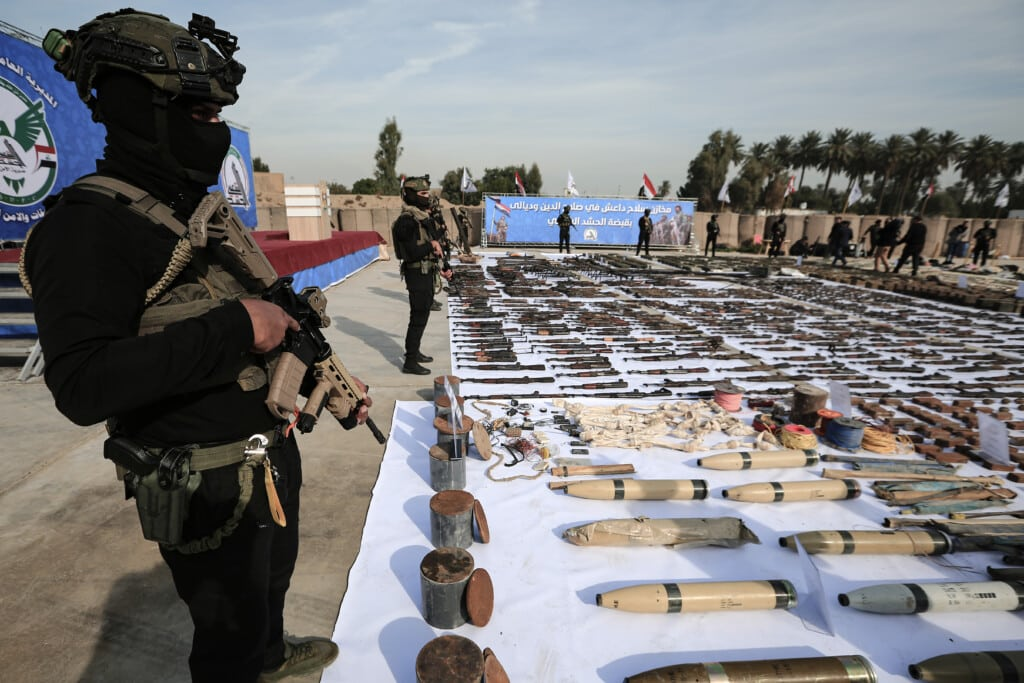
Iranian-backed militias in Iraq continue to launch drone and missile attacks against Israel in a show of solidarity with their allies in Gaza and Lebanon. Although many claims remain unverified, some attacks have targeted Israeli military personnel. On Monday, Israeli Foreign Minister Gideon Sa’ar urged the UN Security Council to pressure Iraq to curtail the activities of Iran’s proxies, emphasizing Israel’s right to self-defense under the UN Charter.
An Israeli airstrike on the Syrian city of Palmyra — a known hub for Iranian proxies — resulted in the deaths of over 90 terrorists, including operatives affiliated with Iraq’s Harakat Hezbollah al-Nujaba. This action suggests Israel is intensifying its efforts to weaken these militias, which have operated with relative impunity for over a year. Without stronger U.S. pressure on Baghdad to rein in these groups, further Israeli retaliatory actions appear inevitable.
Baghdad Has Struggled to Contain Iran-Backed Militias
Despite their formal integration into the Popular Mobilization Forces (PMF) and legal operation under the Iraqi government, Iraqi militias often launch attacks on Israel at the behest of their patrons in Tehran, enacting its strategy to encircle Israel with a “ring of fire” in the wake of the October 7, 2023, Hamas atrocities.
This allegiance has strained Iraq internally, with Prime Minister Mohammed Shia al-Sudani struggling to control militia actions that frequently defy state policy. Although reforms have aimed to limit their independence, these groups often disregard Baghdad’s directives. Highlighting this tension, Ibrahim al-Sumaida’i, advisor to the prime minister, warned that the “actions of the Iraqi resistance embarrass the state” and stressed the need to prevent Iraq from becoming a corridor for missiles and drones used by external actors.
Israel’s Patience Is Nearing Its Limit
Iranian-backed militias in Iraq have claimed responsibility for over 300 attacks targeting Israel over the past year. Of these, 89 have reached Israel, where the projectiles were either intercepted or landed in open areas. Notably, a UAV attack on October 3 killed two Israeli soldiers in the Golan Heights.
The initiation of Israel’s ground operation in southern Lebanon has triggered a surge in attacks from Iraqi militias, with 51 confirmed incidents since October 1 — a 75 percent increase in confirmed attacks compared to previous months.
This amounts to an intolerable situation for Israel. While currently engaged on two fronts, Israel remains fully capable of addressing the threat from Iraq. The Israeli strike in Palmyra may mark the beginning of Israel’s retaliatory campaign against Iranian proxies following a year of restraint in the face of persistent aggression.
Is U.S. Diplomatic Pressure on Iraq Capable of Preventing Escalation?
Washington has warned Baghdad that Israeli strikes are imminent unless the Iraqi government curtails militia attacks against Israel. In response, Prime Minister Sudani issued security directives to assert state control over military operations. Despite these efforts, the proxies have continued their aggression.
Simply pressuring the Iraqi government is insufficient, as Iran has long exploited Iraq as a vassal state and a hub for its proxy network. The solution lies in bolstering Israel’s capacity to retaliate decisively, thereby establishing deterrence — much like the United States achieved in February to stop attacks on its own bases in Iraq and Syria.
